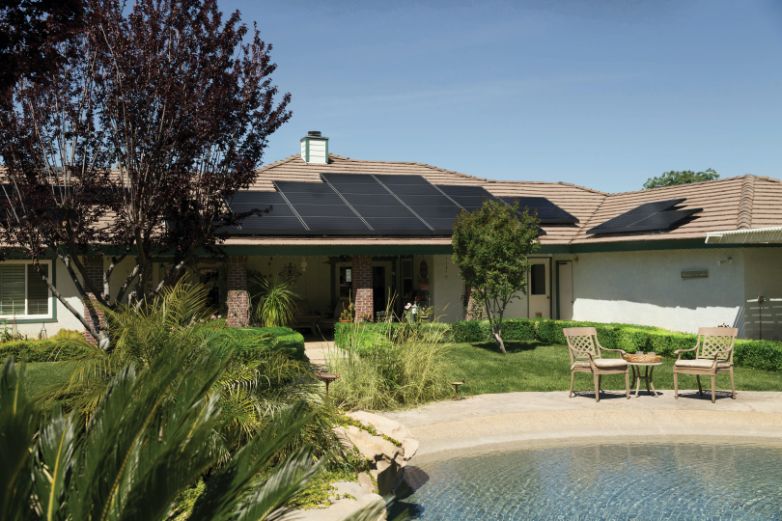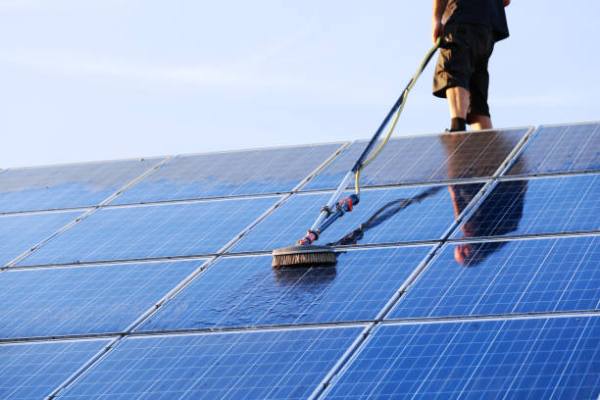For supplying home energy requirements, solar panels are growing in popularity. They produce a current that is then converted into usable electricity by absorbing sunlight. Studies have shown that human pollution can reduce a solar panel system’s efficiency by up to 25% and make the panels dirty. So, how to clean your solar panels? Please keep reading.
Common Solar Blockers
Dust
The performance of your panel is negatively impacted by dust accumulation, so regular panel maintenance is essential. There are many variables that affect how frequently your solar panels should be cleaned.
Do solar panels get dirty? The quick response is “yes”!
Your geographic location and the nearby elements that could contaminate your system are the main causes of dust build-up.
The majority of large studies report that dust build-up can reduce our system’s efficiency in just a minute — around 5% or less — even though heavy rain, as some smaller studies suggest, might help to clean and clear debris and pollutants from your panels.
According to one study, properly maintained solar panels function 3.5% more efficiently. CleanTechnica reported an analysis, gathered by the US National Renewable Energy Laboratory (NREL), that panels lose around 30% if not cleaned properly.
In addition to blocking sunlight, leaves are another common pollutant that reduces the effectiveness of your solar panels. Mountain View, a solar energy provider, reports that clean panels can double the energy overnight, even after 15 months of operation.
Solar panels will need more frequent and thorough maintenance if they are installed in dust-prone areas, such as close to busy roads and agricultural areas. Solar production may suffer if the dust on the panels installed in these locations is not removed.
Bird Droppings
Bird poop can have a bigger impact on a panel’s performance than dust accumulation. If bird droppings cover all or part of one solar panel in a typical string-inverter PV system, there may be little to no energy generated.
The affected panel or panels in a micro-inverter system might produce little to no power. More information about string and micro-inverters is available here.
Nearby trees will not only slough off their leaves and branches, but they will also draw birds. Over time, these result in bird droppings and debris, which not only require cleaning and clearing but also present a safety hazard. To prevent birds from nesting in your gutters, you may need to clean them monthly or annually.
Another consideration to keeping your panels performing at their best is the angle. Flat arrays will require more maintenance because water can collect and, when it evaporates, leave a muddy residue.
On the other hand, arrays that are properly angled can benefit from the rain without leaving behind muddy residue. This is due to the ease with which rain can easily wash away dust and other pollutants, keeping them largely clean.

How To Clean Solar Panels
Choose The Right Time
Choosing the ideal time of day to clean your solar panels is the first and most important step. What time has to do with cleaning may be a mystery to you. By cleaning your solar panels at the wrong time of day, you run the risk of doing long-term damage.
When you clean your system in the late afternoon, the sun is at its strongest, which means you are cleaning the panels when they are hottest.
A sudden drop in temperature caused by water being poured on hot panel glass will cause the glass to shatter. Additionally, any water you pour on the panels will quickly dry out because of how strong the sun is, leaving patches of watermarks.
Additionally, cleaning your system at this time of day would mean that you are interfering with your solar energy supply just as it is producing at its highest rate for the day.
Shut Down Your Solar Panel System
It’s critical that you make sure your system is completely off before you start the cleaning. Make sure you correctly follow the instructions in the user’s manual you received when installing the system because it will be inscribed with the shutdown procedure.
For additional guidance, you should consult the inverter manufacturer’s operating handbook.
Ensure that all DC or direct current systems are completely shut off. Using the main switch for the solar supply, you can turn off the AC systems.
This is because working on live electrical components with water is never a good idea as even a tad bit of water seeping into any of the live components or circuits could lead to a massive electrical catastrophe such as fire due to short-circuiting.
Disconnect Or Block Your Gutters Or Rainwater Collectors
For later use, rainwater runoff from roofs is collected in rainwater tanks, which are found in many homes. You should momentarily disconnect or block off the channel to those tanks in order to stop the dirty runoff water from getting mixed in with your clean water.
Brush Off Dirt And Grime
Brush off as much dry grime and dirt as you can before wetting your panels. As a result, cleaning solar panels is simpler.
Wet The Solar Panels
Although clean solar panels are significantly more effective, you must clean them carefully to prevent damaging the panels. Make sure the water is only splashed onto the panels’ top surface.
The PV modules’ backs may come into contact with some water during the cleaning process, but you must take care not to let it get into the space between the panels and the roof.
Use Mild Soap And A Soft Cloth
Use a soft cloth and mild soap to wash your panels to get rid of the dirt and grime that has accumulated there that is difficult to clean. In addition, you can use a windshield wiper, a high-quality soft brush, or a cloth-wrapped sponge to wipe the surface of the panels.
Any of the tools mentioned earlier can be connected to a lengthy extension, allowing you to safely clean the panels while laying on the ground.
After getting rid of the enduring dirt and debris, rinse the panels with clean water. Make sure the panels have been completely washed of soap and dried completely. By air-dying the panels, any residual soap or water stains can be avoided.
What Not To Do When Cleaning Solar Panels
Use A Pressure Washer

Pressure washers are fantastic for cleaning your home’s exterior components, such as the roof and gutters, but they should never be used to clean solar panels.
While some may argue that the high pressure and enormous reach of these tools make cleaning large areas of the panels relatively simple, doing so runs the risk of damaging your solar panels by scratching or even cracking the glass panes.
Additionally, the force of the highly pressured water may cause the panel attachments to become loose, allowing water to enter the panel. Therefore, avoid the use of high-pressure washers!
Hard Bristle Brushes
Dirt and grime can accumulate and latch themselves onto the surface of your panels. It can be quite difficult to remove this dirt and grime buildup, so a brush and some mildly soapy water are required.
However, when selecting a brush for your cleaning, always go for a high-quality soft brush to avoid damaging the panels’ surface.
Using a hard bristle brush, on the other hand, can lead to a damaged panel surface. Hard bristles brushes can scratch the surface of the panels. Much of the incident solar energy will be scattered by a lot of tiny scratches.
This could lead to a decrease in efficiency or even prevent the solar panels from capturing energy from the sun. Never use a harsh bristle brush, even if you just want to be careful, as it will almost certainly cause permanent harm.
Strong Cleaning Fluids
You might assume that using stronger cleaning solvents would be a good solution because of the tough dirt and grime that is difficult to remove. On the contrary, using cleaning products with powerful and abrasive chemicals in them may harm the glass panels and diminish their efficiency dramatically.
Instead, avoid anything with high alcohol content and use liquid soaps sparingly when cleaning solar panels.
Safety Considerations
- Before cleaning, solar panels must be turned off, and the underside must never be accessed.
- It’s safest to clean solar panels from the ground with extension tools while wearing gloves. However, third- or second-story homes might necessitate scaling the roof.
- Homeowners who aren’t sure they can safely clean their solar panels should think about hiring a local solar power expert to do it instead.
Final Words
Solar panel cleaning may seem annoying, but it is actually very important to keep solar panel systems performing at their best. By allowing you to recover your installation costs faster and giving you a more consistent energy output, the advantages of doing this will undoubtedly outweigh the inconvenience.
Cleaning solar panels necessitates close attention to safety because they are frequently installed on roofs or other high places. The only solar panels that should be cleaned without professional assistance are those that are accessible and secure.
